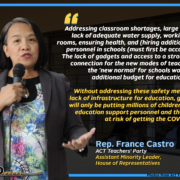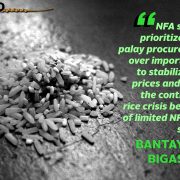Emergency relief and COVID-19 response more important than debt payments
by IBON Media
Emergency relief for millions of Filipino families during the unprecedented COVID-19 crisis is more important than mindless debt servicing, research group IBON said.
The government should get its priorities straight, said the group, and seriously consider at least a moratorium on the government’s debt payments.
This will help provide much-delayed relief and financial assistance to the most vulnerable Filipinos affected by the coronavirus lockdown.
Finance Secretary Carlos Dominguez recently rejected the proposal of economic affairs committee chair Senator Imee Marcos to seek a moratorium on debt payments to enable additional funding for the country’s COVID-19 response measures.
Dominguez said the proposition has not been and will never be considered despite the pandemic.
Honoring its financial obligations, he said, is the strongest pillar of the Philippines’ standing in the global community and the reason behind investor confidence in the economy, he added.
IBON executive director Sonny Africa said that the government’s obsession with so-called creditworthiness is blinding it to how a moratorium can help give much more, and much more quickly, to the poor amid the raging coronavirus crisis and its burdensome impact.
“The Philippines is in the worst public health crisis in its history,” Africa said.
“The poor already suffer the worst economic crisis in decades – aggravated by the Duterte administration’s slow response to contain the pandemic, over-reliance on a harsh military lockdown, and stingy relief efforts,” he added.
Africa said that government should stop its wilful blindness to what the people need, which is hindering the country’s ability to stop the spread of COVID-19, build up the public health system, and give relief to millions of Filipinos. At least part of the over Php1 trillion in funds for debt servicing in 2020 can
be used for urgent COVID-19 response instead, he said.
The national government is paying Php1.03 trillion to service debt in 2020 – Php451 billion for interest payments and Php582.1 billion for principal amortization. Some Php285.8 billion of this goes to servicing foreign debt.
The Duterte administration needs to drastically increase spending to respond. It can begin by negotiating with foreign multilateral and bilateral agencies to waive interest and principal payments or even to totally cancel Philippine debt obligations in the face of the pandemic, said Africa.
“The government will be paying so-called development agencies and supposedly friendly governments at least US$5.2 billion in 2020,” Africa said. T
his consists of: US$686.6 million to the Asian Development Bank (ADB); US$433.8 million to the World Bank; US$406.9 million to Japan; US$21.4 million to China; and US$17.3 million to the United States.
Africa said that the government’s narrow-minded debt policy is the biggest stumbling block to a debt moratorium.
“Creditors will always want to be repaid. The government’s job is to struggle for the best possible terms for the country and not to defend creditors’ claims,” he said.
“The suffering of so many proves we are a country in need. The government should stop pretending that a policy of debt relief and debt restructuring is not an urgent option,” Africa said. #







